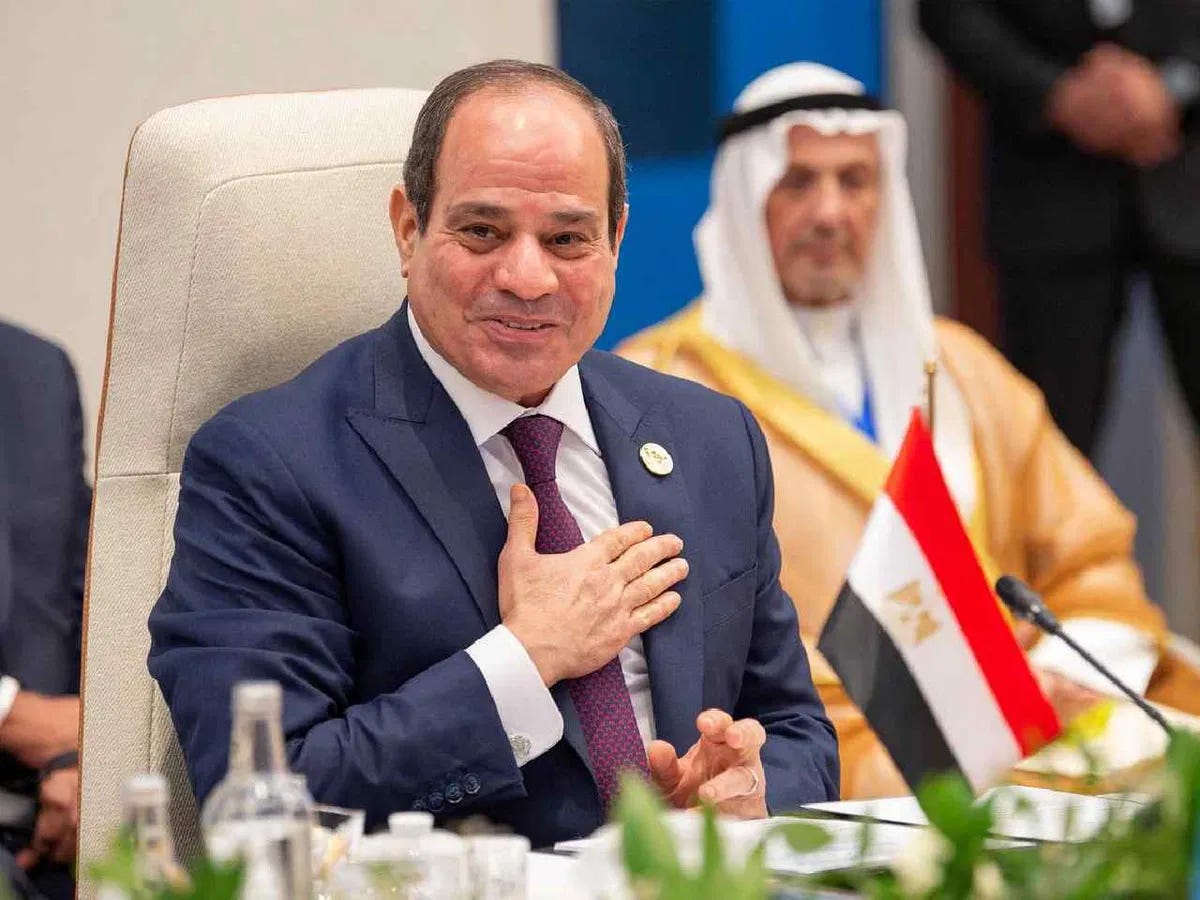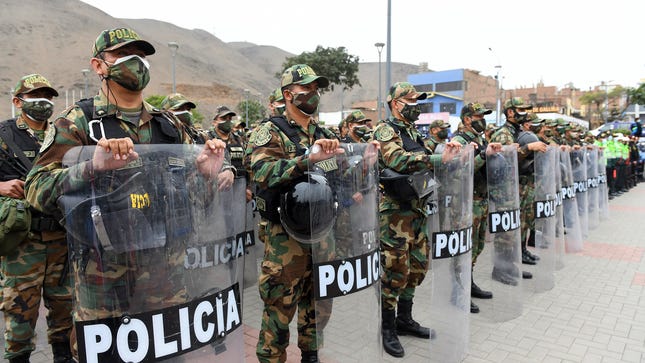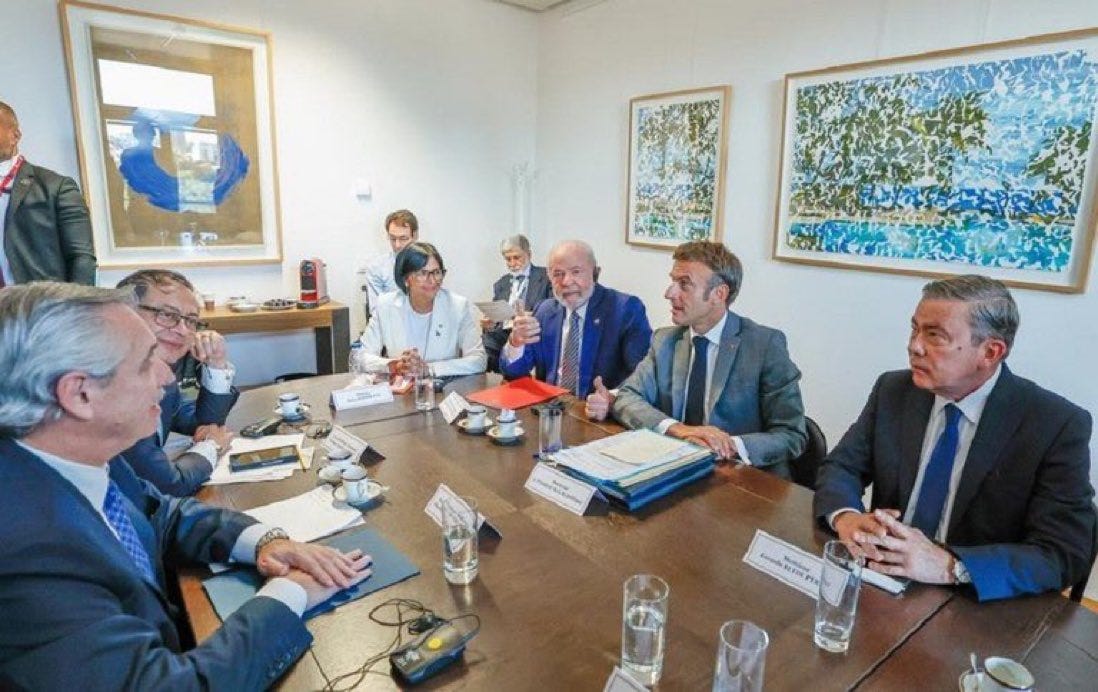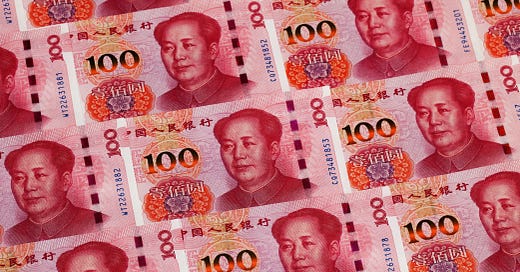This week - Yuanisation, EU-Tunisia deal, Egypt on sale, Peru state of emergency.
Week of July 17th, 2023.
This week, we are sending out the newsletter on a Wednesday due to the exclusive we released on Monday morning. Having spoken with officials at the EU-CELAC summit, we published unique insights into Venezuela’s sanctions. We also analysed key points on relations between Europe and the Latin America & Caribbean region. We are also including a short update in this release.
In this newsletter, the big topic we are discussing is the growing role of Chinese currency in international trade - with the backdrop of political rhetoric about “de-dollarisation” becoming more popular.
In the Central Banks section, we are discussing the Mexican peso’s continued strengthening, a topic we have been watching since we launched Over the Hedge.
“Yuanisation”
The IMF has announced that this June, Argentina met its payment obligations. The country made the $2.7 bn payment by using its existing stock of the IMF's reserve assets, and Chinese currency. Although unconventional, the yuan is part of the fund’s basket of currencies that countries can use to make payments. Buenos Aires has also renewed a three-year currency swap agreement with Beijing to strengthen its reserves and will start to pay for Chinese imports in yuan rather than dollars.
In the case of Argentina, and of neighbouring Bolivia, reducing their dependency on the greenback is a pressing economic necessity, beyond political rhetoric. The region is highly dollarised, and any imbalance can put a heavy strain on their economies. Both countries are considering giving a stronger role to the yuan, given China is the other major trade partner.
Argentina’s largest neighbour is also taking steps to “yuanise”. Earlier this year the central banks of Brazil and China agreed to enable direct conversion between their currencies without the need for the intermediary US dollars. While the short-term impact will be small, Brazilian financial services will gradually offer more yuan-linked derivatives and loans.
Rather than one single currency replacing the dollar, the current process points towards an era where countries will have a handful of options to choose from for international payments. In Latin America, outside of the political debate of being for or against “US imperialism” there is a much more pragmatic element. Some countries are seeing China become their main trade partner, and thus it does not make economic sense to use the dollar as an intermediary. Meanwhile, some Central American countries such as Mexico and Costa Rica are still thoroughly connected to US trade, tourism and remittances, and are comfortable with the dollar.
EU and Tunisia sign migration deal

EU leaders and Tunisian President Kais Saied are set to finalize a new agreement on migration control in the Mediterranean which would secure over 1 billion dollars in funding to Tunisia in efforts to curb migration. The deal was preceded by visits from the leaders of Italy (Giorgia Meloni), the Netherlands (Mark Rutte) and European Commission President Ursula Von der Leyen. Read more about it here.
Tunisia has long been a popular route for migrants to cross the Mediterranean and enter Europe. The new agreement has been the subject of debate among EU lawmakers including two MEPs from the Netherlands and Germany who were critical of securing funding for a leader responsible for democratic backsliding and the suppression of opposition. Critics of Saied in Tunisia likewise criticized the decision of EU leaders to provide funding and debt relief whilst the president continues to imprison and crack down on members of the opposition.
Others have also expressed concern that Tunisia would be unable to effectively handle migrants pointing to the ongoing racially motivated attacks on migrants and black Tunisians in the country and allegations of human rights abuses committed by Tunisian authorities against African migrants.
Israel recognizes Morocco’s claims over the Western Sahara

Israel announced its recognition of Morocco’s claims over the contested region of Western Sahara which has been under Moroccan occupation since 1975. In parallel to the Israeli occupation of Palestinian land and amid efforts to normalize relations with Arab states, Israel has moved forward with its recognition of the Western Sahara as Morocco’s sovereign territory and plans to open a new consulate in the city of Dakhla. This decision was preceded by the controversial Abraham Accords which saw a handful of Arab states normalize relations with Israel in negotiations brokered by the US under then-President Donald Trump.
Israel's recognition of the Western Sahara as Moroccan territory is likely an attempt to form new Allies as international criticism towards its treatment of Palestinians and continued illegal occupation grows. However, there have not been indications that Morocco would abandon its support for Palestine as the nation’s current king has reportedly declared that Morocco remained committed to the Palestinian cause, though using more neutral languages akin to Western states and Allies of Israel. Regardless of how this may impact future Morocco-Israel relations, it will likely embolden Morocco to further cement its grip over the Western Sahara and continue efforts as it continues to seek international recognition for its claims.
Egypt for sale

Egypt’s government has agreed to sell $1.9bn worth of state assets to source cash and pay back its hard currency obligations. These include so-called eurobonds (dollar-denominated) and a $3bn deal with the IMF. We have reported on President Abdel Fattah el-Sisi’s ambitious construction projects, which have drained the state coffers without boosting the economy.
Most assets will be sold to the Abu Dhabi wealth fund ADQ, and to domestic firms. According to investors cited by Bloomberg, this is just the start of a larger privatisation project. Another $1bn sale is expected to be announced soon. Egypt’s debt-to-GDP ratio is near 98%, an unusually high figure for a middle-income country. Inflation is also soaring, as it reached 36% year-on-year in June, largely due to the Egyptian pound’s devaluation.
State of Emergency in Peru

The president of Peru, Dina Boularte, has declared a state of emergency on a national level, for 30 days. This is to combat protesters who will attempt to converge on the capital, Lima. The planned event has been called “the Siege of Lima” (Toma de Lima in Spanish), and would be the third attempt by mass protests to remove the president.
The president had already declared a state of emergency in some departments around the country, especially on major routes towards the capital. The police are already expecting to encounter roadblocks around Lima. The army is already acting around the country supporting security forces. It is estimated that 70 people could have already been killed in protests against Boularte since she was sworn in.
Since Boularte’s predecessor, Pedro Castillo, was ousted by Congress on December 7th, 2022, protests have wreaked havoc across the country. Castillo’s support base still considers him the president and brands Boularte as an illegitimate ruler. Surveys are showing the class-based nature of polarisation in Peru. According to polling firm Ipsos, 71% of executives support President Boularte, whereas different approval ratings for the broad population put her at 12-14%.
Meanwhile, too many holidays
Ministers will also seek to reduce the number of holidays in the country, which has one of the highest, with 16 days off. Just last week, a right-wing majority Congress added July 23rd, in remembrance of heroic acts in the war against Ecuador (1941-1942). The executive branch of government, however, has been showing its reticence to increase the number of holidays, arguing they hamper productivity. The symbolism of the occasion also reflects the chauvinism of the class most represented in government, fomenting rivalry with neighbouring Latin American countries - as opposed to political trends that favour regional unity and enmity with the US.
EU-CELAC Summit update

On the sidelines of the EU-CELAC summit, a small meeting could be laying the groundwork for an ease in relations between Europe and the Venezuelan government. The meeting brought together the government and opposition with Presidents Emmanuel Macron (France), Luis Ignacio “Lula” da Silva (Brazil), Gustavo Petro (Colombia), and Alberto Fernandez (Argentina), plus the EU’s top diplomat, Josep Borrell. Vice-President Delcy Rodriguez represented the government and Gerardo Blyde went in the name of the opposition alliance MUD.
After the meeting, Borrell said that it was a step in the right direction although not many agreements were reached. Petro offered Colombia to host future negotiates. This meeting can be seen as refreshing after a series of escalations jeopardised further rapprochement between the Venezuelan government, the opposition, and Europe. In the future, with an agreement reached, the EU could advocate for easing pressure in Washington DC, as it is doing with Cuba, especially if European commercial interests are involved.
Central Banks
Peso continues to strengthen
The Mexican currency has continued to make gains against the dollar throughout the year reaching levels last seen in 2015. The exchange rate currently stands at 16.8 pesos per dollar, against 20.5 at the start of the year. This phenomenon comes alongside modest economic growth, while it is higher than in developed economies.
Since Over the Hedge’s launch, we have been tracking the peso’s appreciation. On one hand, Mexico is benefitting from large inflows in the form of FDI, remittances and tourists and immigrants - “expats” and “digital nomads”, as they prefer to be called. Then, the central bank has sustained rates well above the Federal Reserve’s - as seen across many Latin American countries. While last year the monetary policy pivot in Washington started closing in the gap between the peso and the dollar, it is unlikely that the Fed will hike further.
India-UAE deal
Reserve Bank of India and the Central Bank of the UAE signed two memorandums of understanding to settle trade in rupees and dirhams to decrease dependence on the US dollar and strengthen bilateral trade between the two countries.






